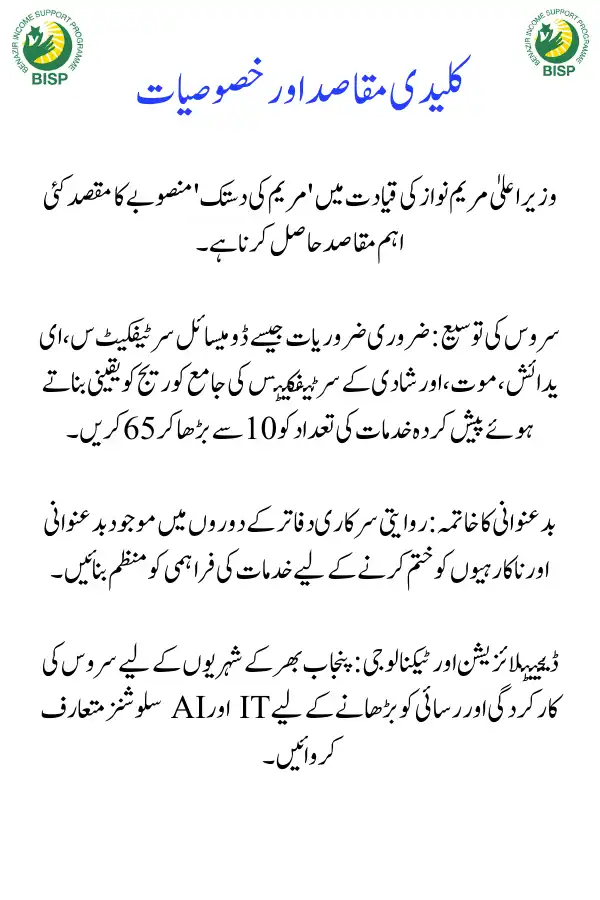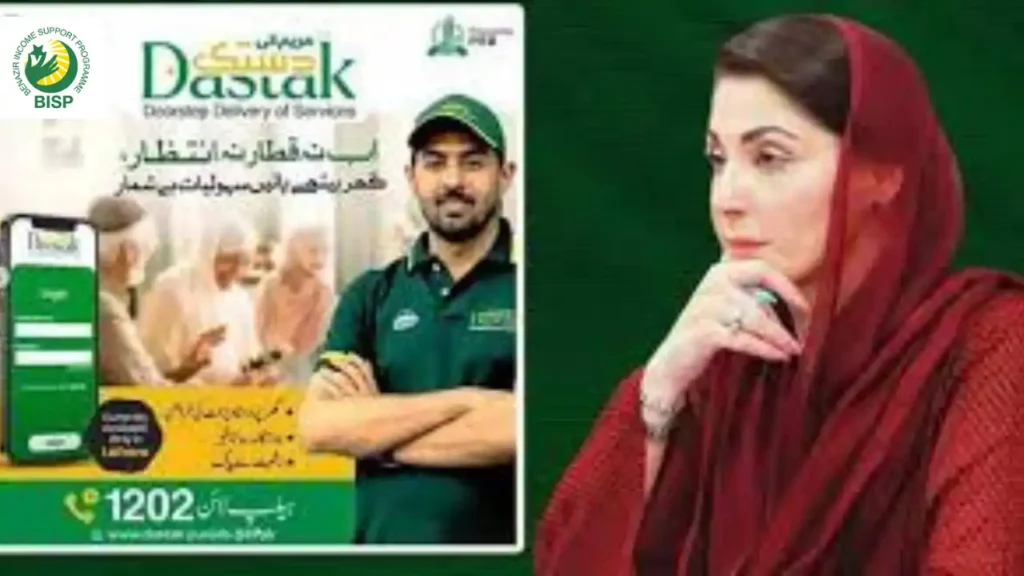Maryam ki Dastak:
Introduction to Maryam ki Dastak Project
The ‘Maryam ki Dastak’ project, initiated under the directives of Punjab Chief Minister Maryam Nawaz, marks a significant step towards enhancing citizen accessibility to essential services across all districts of Punjab. This innovative endeavor aims to expand from offering 10 to 65 services directly to citizens’ doorsteps, revolutionizing the way government services are delivered. Emphasizing the eradication of corruption and leveraging Information Technology (IT) and Artificial Intelligence (AI), the project underscores Punjab’s commitment to embracing digital transformation for effective governance.
Key Objectives and Features
Under the leadership of Chief Minister Maryam Nawaz, ‘Maryam ki Dastak’ project aims to achieve several key objectives:
- Service Expansion: Increase the number of services offered from 10 to 65, ensuring comprehensive coverage of essential needs such as domicile certificates, e-stamping, birth, death, and marriage certificates.
- Corruption Eradication: Streamline service delivery to eliminate corruption and inefficiencies prevalent in traditional government office visits.
- Digitization and Technology: Introduce IT and AI solutions to enhance service efficiency and accessibility for citizens across Punjab.

Registration Process and Criteria
The registration process for ‘Dastak Representatives’ is designed to engage hundreds of thousands of youngsters as facilitators within the project. Key criteria for becoming a Dastak representative include:
- Educational Qualification: Minimum intermediate education level.
- Technological Requirements: Possession of a mobile phone with internet connectivity.
- Logistical Requirements: Possession of a personal motorbike and a valid driving license.
- Clearance Certificate: Clearance from the concerned police station.
Training and Employment Opportunities
Once selected, Dastak representatives will undergo comprehensive training to equip them with the necessary skills and knowledge to effectively facilitate the delivery of services. Beyond serving as facilitators, these representatives will also find employment opportunities within the project, contributing to economic empowerment and youth engagement in Punjab.
Impact on Citizen Services
‘Maryam ki Dastak’ project promises to significantly enhance the accessibility and efficiency of citizen services in Punjab:
- Convenience: Services delivered directly to citizens’ doorsteps, reducing the need for multiple visits to government offices.
- Transparency: Implementation of IT solutions ensures transparency and accountability in service delivery.
- Empowerment: Empowering citizens by providing easy access to critical documents and services essential for their everyday needs.
Also Read: Green Tractor Scheme:

Conclusion
In conclusion, the ‘Maryam ki Dastak’ project exemplifies Punjab’s commitment to leveraging technology and youth potential to transform public service delivery. By expanding service accessibility and streamlining processes, the project not only aims to eradicate corruption but also aims to empower citizens by providing efficient and transparent access to essential services. As Punjab enters the digitization era, initiatives like ‘Maryam ki Dastak’ set a precedent for effective governance and citizen-centric service delivery nationwide.
Quick Details Table
| Project Name | Maryam ki Dastak Project |
| Initiator | Punjab Chief Minister Maryam Nawaz |
| Services Offered | 65 services (expanded from 10) including domicile, e-stamping, birth, death, marriage certificates |
| Educational Qualification | Minimum Intermediate |
| Technological Requirements | Mobile phone with internet connectivity |
| Logistical Requirements | Personal motorbike and valid driving license |
| Training Provided | Comprehensive training for selected representatives |
| Employment Opportunities | Employment opportunities within the project for selected representatives |
The ‘Maryam ki Dastak’ project not only promises to simplify the lives of citizens by delivering essential services at their doorstep but also aims to create significant employment opportunities for youth in Punjab. Through effective utilization of technology and a focus on transparency, the project sets a benchmark for innovative governance in Pakistan.
